Whether you like classical or country, ’33 Variations’ is not to be missed
 In the first scene of 33 Variations, musical historian Dr. Katherine Brandt asks why a genius like Beethoven devoted a massive chunk of his final years to writing nearly three dozen variations on a mediocre waltz composed by his publisher, Anton Diabelli? She proposes a hypothesis: Beethoven was determined to show Vienna and all the world that he was so talented, he could create magic from a mere grain of sand. But Brandt’s premise reveals her own
In the first scene of 33 Variations, musical historian Dr. Katherine Brandt asks why a genius like Beethoven devoted a massive chunk of his final years to writing nearly three dozen variations on a mediocre waltz composed by his publisher, Anton Diabelli? She proposes a hypothesis: Beethoven was determined to show Vienna and all the world that he was so talented, he could create magic from a mere grain of sand. But Brandt’s premise reveals her own 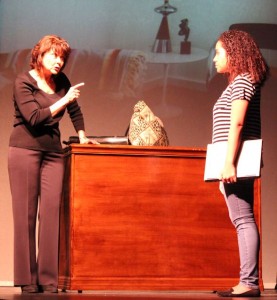 shortcomings. It was not that Diabelli’s waltz was mediocre, but that Brandt did not possess the vision to see the seeds of greatness lying dormant within the musical score. Beethoven did, and four years later, he produced not one but 33 variations, commonly called the Diabelli Variations, which revolutionized how music was composed for and played on the piano.
shortcomings. It was not that Diabelli’s waltz was mediocre, but that Brandt did not possess the vision to see the seeds of greatness lying dormant within the musical score. Beethoven did, and four years later, he produced not one but 33 variations, commonly called the Diabelli Variations, which revolutionized how music was composed for and played on the piano.
Theatre Conspiracy director Rachel Endrizzi is similarly sighted. Moises Kaufman’s script contains scant directions for how to stage his play. But the way she moves her  actors on, off and across the Foulds Theatre stage is genius. The non-stop action is captivating, mesmerizing, spellbinding. If not a waltz, it is certainly an elegant minuet choreographed with the precision and imagination of a Derek Hough dance routine.
actors on, off and across the Foulds Theatre stage is genius. The non-stop action is captivating, mesmerizing, spellbinding. If not a waltz, it is certainly an elegant minuet choreographed with the precision and imagination of a Derek Hough dance routine.
While classical music and musical composition is front and center in 33 Variations, the play is actually more about the interplay between art, creativity and obsession. Local icons like Thomas  Edison and Robert Rauschenberg were notoriously compulsive. From art to athletics, great achievements almost always result from a consuming, all-encompassing, burning desire to win or succeed. But for those on the periphery, it can be challenging to keep pace. And in 33 Variations, Kaufman provides us with the poignant point and counterpoint to this proposition in the
Edison and Robert Rauschenberg were notoriously compulsive. From art to athletics, great achievements almost always result from a consuming, all-encompassing, burning desire to win or succeed. But for those on the periphery, it can be challenging to keep pace. And in 33 Variations, Kaufman provides us with the poignant point and counterpoint to this proposition in the 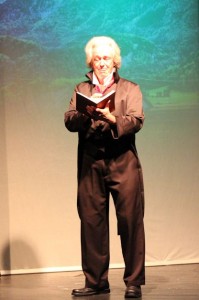 guise of Katherine Brandt and her daughter, and Beethoven and his personal assistant, Anton Schindler, who struggle to understand and appreciate each other.
guise of Katherine Brandt and her daughter, and Beethoven and his personal assistant, Anton Schindler, who struggle to understand and appreciate each other.
Kaufman smartly counterbalances weighty themes like these with wit, humor and lightheartedness, and by moving the action back and forth from the present to Beethoven’s time period and back again. Particularly effective is the way Kaufman intertwines his separate storylines and subplots to contrast and parallel the rapidly declining health of Brandt and Beethoven as they rush to complete their respective projects – and the impact of their frenetic and often frantic efforts on the people who love and support them.
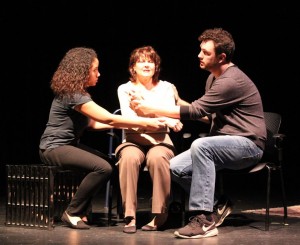 Of course, excellent writing and inspired directing go for naught unless coupled with good acting. The acting here is not merely good. It is exceptional, beginning with Lauren Drexler who plays Dr. Katherine Brandt. Her past credits include many memorable roles, but her performance in 33 Variations is nothing short of career-defining. This writer has been touched by ALS and witnessed the inexorable physical deterioration, emotional terror and intellectual resignation that
Of course, excellent writing and inspired directing go for naught unless coupled with good acting. The acting here is not merely good. It is exceptional, beginning with Lauren Drexler who plays Dr. Katherine Brandt. Her past credits include many memorable roles, but her performance in 33 Variations is nothing short of career-defining. This writer has been touched by ALS and witnessed the inexorable physical deterioration, emotional terror and intellectual resignation that 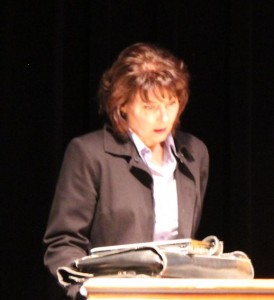 accompanies the progression of the disease. Drexler perfectly portrays the foot-drag, stumbles, cramped fingers, uncontrollable laughter and more subtle telltale symptoms of ALS. In this regard, Drexler’s performance is not just convincing, it’s compelling.
accompanies the progression of the disease. Drexler perfectly portrays the foot-drag, stumbles, cramped fingers, uncontrollable laughter and more subtle telltale symptoms of ALS. In this regard, Drexler’s performance is not just convincing, it’s compelling.
But there’s so much more to her performance. Her reverence and rapture as she touches a white gloved hand to Beethoven’s notebook, her growing attachment to the initially cool and aloof Beethoven archivist, Dr. Gertrude Ladenberger, and her withering disapproval of her 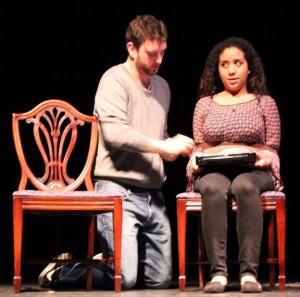 underachieving daughter, Clara, belie not only Drexler’s range and depth as an actor, but her keen understanding of her character.
underachieving daughter, Clara, belie not only Drexler’s range and depth as an actor, but her keen understanding of her character.
Julia Rivera is superb as Clara Brandt, as is PJ McCready who plays Mike, her mom’s male nurse who falls head-over-heels for Clara. Their early get-to-know-each-other scenes are both funny and endearing, and the scene in which he teaches Clara how to exercise her mother’s arms and shoulders in order to ease her labored breathing is especially touching.
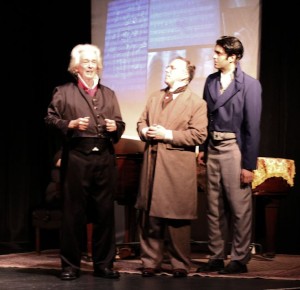 Fresh from playing Pinchwife in The Country Wife, Jim Yarnes returns to the Foulds Theatre stage to bring the world’s [second] greatest composer to life. It’s a role he’s uniquely qualified to reprise, and he plays the part with verve and distinction. Scott Carpenter is masterful as Beethoven’s befuddled and self-aggrandizing assistant, Anton Schindler, as is David Coretti as the flummoxed and hard-pressing publisher Anton Diabelli. It bears noting that the accents of all three actors are impeccable; their diction easily understood.
Fresh from playing Pinchwife in The Country Wife, Jim Yarnes returns to the Foulds Theatre stage to bring the world’s [second] greatest composer to life. It’s a role he’s uniquely qualified to reprise, and he plays the part with verve and distinction. Scott Carpenter is masterful as Beethoven’s befuddled and self-aggrandizing assistant, Anton Schindler, as is David Coretti as the flummoxed and hard-pressing publisher Anton Diabelli. It bears noting that the accents of all three actors are impeccable; their diction easily understood.
 It is hard to imagine how this play could have been produced without placing a piano and pianist on stage to demonstrate the progress Beethoven makes as he produces variation after variation of Diabelli’s beer hall waltz. Heidi Thompson does the honors, and plays with feel and passion, particularly during a riveting scene near the end of the play in which Yarnes’ Beethoven narrates the changes he made in Variation #33 to transform Diabelli’s waltz into an exquisite minuet.
It is hard to imagine how this play could have been produced without placing a piano and pianist on stage to demonstrate the progress Beethoven makes as he produces variation after variation of Diabelli’s beer hall waltz. Heidi Thompson does the honors, and plays with feel and passion, particularly during a riveting scene near the end of the play in which Yarnes’ Beethoven narrates the changes he made in Variation #33 to transform Diabelli’s waltz into an exquisite minuet.
 Whether you love classical or country, metal or doo-wop, 33 Variations is one play you cannot afford to miss. Seating is limited, and there are only nine performances in this all-too-brief engagement. Reserve your seats today.
Whether you love classical or country, metal or doo-wop, 33 Variations is one play you cannot afford to miss. Seating is limited, and there are only nine performances in this all-too-brief engagement. Reserve your seats today.
January 20, 2017.
RELATED POSTS.
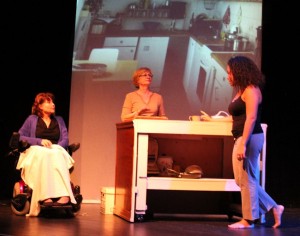 You need not know Bach from Beethoven to enjoy Theatre Conspiracy’s ’33 Variations’
You need not know Bach from Beethoven to enjoy Theatre Conspiracy’s ’33 Variations’- Rachael Endrizzi directs Moises Kaufman’s ’33 Variations’
- Lauren Drexler stars as Dr. Katherine Brandt in ’33 Variations’
- Jim Yarnes plays legendary composer Ludwig van Beethoven in ’33 Variations’
- Scott Carpenter plays Anton Schindler in ’33
 Variations’
Variations’ - Joann Haley is Beethoven archivist Dr. Gertrude Ladenberger in ’33 Variations’
- ’33 Variations’ play dates, times and ticket information














 Tom Hall is both an amateur artist and aspiring novelist who writes art quest thrillers. He is in the final stages of completing his debut novel titled "Art Detective," a story that fictionalizes the discovery of the fabled billion-dollar Impressionist collection of Parisian art dealer Josse Bernheim-Jeune, thought by many to have perished during World War II when the collection's hiding place, Castle de Rastignac in southern France, was destroyed by the Wehrmacht in reprisal for attacks made by members of the Resistance operating in the area. A former tax attorney, Tom holds a bachelor's degree as well as both a juris doctorate and masters of laws in taxation from the University of Florida. Tom lives in Estero, Florida with his fiancee, Connie, and their four cats.
Tom Hall is both an amateur artist and aspiring novelist who writes art quest thrillers. He is in the final stages of completing his debut novel titled "Art Detective," a story that fictionalizes the discovery of the fabled billion-dollar Impressionist collection of Parisian art dealer Josse Bernheim-Jeune, thought by many to have perished during World War II when the collection's hiding place, Castle de Rastignac in southern France, was destroyed by the Wehrmacht in reprisal for attacks made by members of the Resistance operating in the area. A former tax attorney, Tom holds a bachelor's degree as well as both a juris doctorate and masters of laws in taxation from the University of Florida. Tom lives in Estero, Florida with his fiancee, Connie, and their four cats.